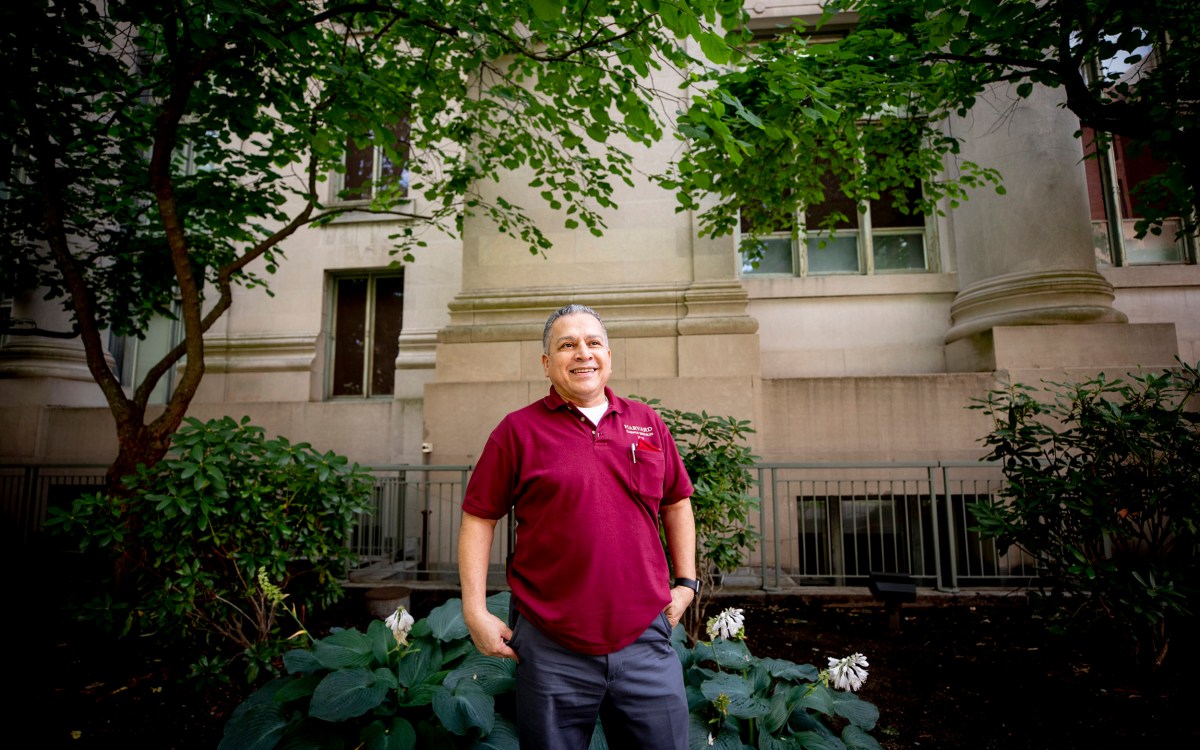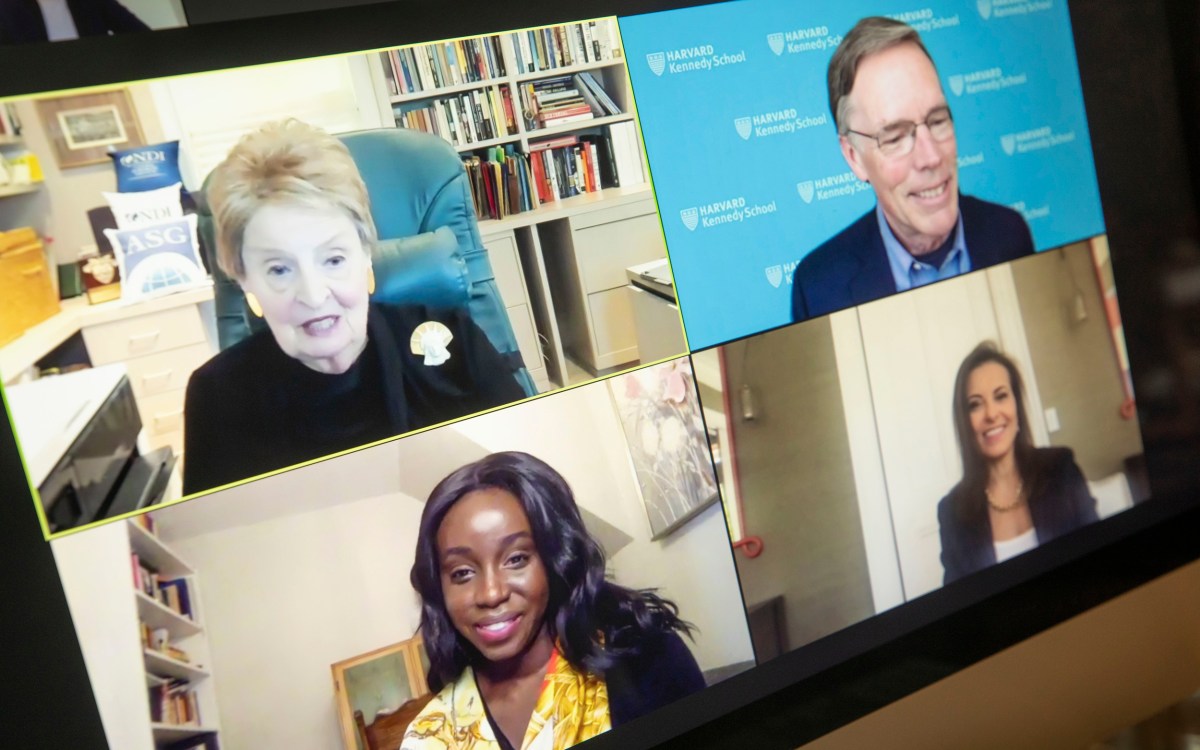
Harvard Global Health Institute and FXB Center hosted a virtual panel on border concerns. It included Eunice Rendon (clockwise from top left), Yael Schacher, Olga Byrne, and Jacqueline Bhabha.
Stephanie Mitchell/Harvard Staff Photographer
Only a little change for migrants at the U.S. border
Humanitarian experts say Biden administration ended most disputed measures but kept much in place
A group of immigration and human rights experts last week raised the specter of the U.S. slipping back into longstanding bad habits at America’s southern border and continuing to take a largely law-enforcement, rather than humanitarian, approach to the current surge of migrants seeking entry.
A panel convened Thursday by the Harvard Global Health Institute and the FXB Center for Health and Human Rights discussed the changes in the months since Joe Biden became president. While they praised several rapid steps he has taken to move away from former President Donald Trump’s more punitive approach, they said Biden has continued to use a federal law, Title 42, which allows U.S. officials overseeing the border with Mexico to bar entry to people on public health grounds. Given the current pandemic, thousands have been expelled, often with little support, into northern Mexico.
“The U.S. does not have a humanitarian reception system,” said Olga Byrne, director of immigration for the International Rescue Committee. “We very much hope that they [administration officials] don’t continue to give in to the inertia and stick to a more enforcement-centric approach.”
Byrne said Trump stepped into a system that was already dysfunctional. He made changes, however, that made it worse for migrants. Biden’s rapid changes earlier this year tossed Trump’s most controversial moves, including the Migrant Protection Protocols, or the “remain in Mexico” policy that denies asylum seekers entrance while U.S. officials consider their application for refugee status, which, if granted, would allow them to stay in the country legally.
He also rescinded the “safe third country” policy that saw migrants sent to a third country like Guatemala while they awaited a U.S. immigration decision, which often left them feeling isolated and bewildered. The Biden administration also began work on a regional effort to address root problems in migrants’ home countries, such as violence and lack of opportunity, that cause them to embark on the dangerous journey to the U.S. despite the uncertainty of gaining entry.
Byrne was joined at the online event, “A Perpetual Crisis: Reflections on the Renewed Public Health Failures at the U.S./Mexico Border,” by Yael Schacher, senior U.S. administrator for Refugees International, and Eunice Rendón, executive director of the Mexico-based Agenda Migrante. Jacqueline Bhabha, research director of the FXB Center for Health and Human Rights and the event’s moderator, said the event’s title seems increasingly apt, since the problem of U.S. immigration is one that has long defied solution, challenging administrations of both parties.
Though Biden has officially ended the Trump-era family-separation policy, the continued use of Title 42 has produced a similar effect, panelists said, by expelling people — half a million of them in the first seven months of the fiscal year — into Mexico for health-related reasons. Instead of going home, these families will often stay near the border and make the difficult decision to send their minor children to the U.S. alone, because administration policy allows unaccompanied minors to wait in the U.S., perhaps with relatives already here, for an asylum decision.
“We very much hope that they [administration officials] don’t continue to give in to the inertia and stick to a more enforcement-centric approach.”
Olga Byrne
While expulsion for medical reasons has a long history — and evokes the idea of “diseased” immigrants — the U.S. hasn’t used the law at today’s levels for some time, Schacher said. She echoed others’ concerns about U.S.’ law-enforcement-heavy approach of apprehension, detention, and expulsion since the migrants are typically fleeing dangerous conditions and persecution in their home countries. Under international law, migrants have a right to seek asylum and are considered asylum-seekers until they are either denied refugee status or granted it, allowing them then to live in the U.S. legally.
Schacher said there’s an underlying assumption that detention is an appropriate, even necessary, tool to manage migrants that ought to be questioned, since, if they haven’t broken laws, alternatives should be available. A humanitarian-exemption process is now being set up for those who are exceptionally vulnerable, Schacher said, but it’s not a substitute for a robust system to receive and evaluate asylum seekers.
Schacher said despite the pandemic, there is no system in place to provide health care for migrants on either side of the border. She and other panelists offered stories of asylum-seekers held for days without food, being falsely told they were being moved to a camp further north in the U.S. when they were in fact being flown to San Diego to be expelled into neighboring Tijuana, Mexico, and of pregnant women, or those who’ve recently given birth, being unceremoniously ejected.
Rendón said there’s little support for migrants in northern Mexico. Most often expelled into Tijuana or Ciudad Juarez (just south of El Paso, Texas), they become prey for criminals, live in temporary, unsanitary conditions, and, for those sick with COVID-19, risk spreading the disease while facing few health care resources.
Hundreds of migrants arrive daily, Rendón said, straining the capacity of local communities. There are 20 shelters in Ciudad Juarez, for example, she said, and all are at capacity, with some at double their intended limit. While acknowledging what she called “inertia” in some administration policies, Rendón praised some steps Biden has taken, like a push to vaccinate immigrant agricultural workers — including those who are undocumented — a policy she hopes will be expanded to border arrivals.
Byrne said devising a humanitarian-focused system to accept and evaluate asylum-seekers is “100 percent on the agenda” for the Biden administration, and the IRC has proposed extending the responsibilities of the Office of Refugee Resettlement, which supports those individuals once they’re accepted into the U.S., to create an arm to handle asylum-seekers as well. In the meantime, however, the law-enforcement-heavy approach continues, with humanitarian aid mostly provided by religious groups and nongovernmental organizations like the IRC, which tends to arrivals’ immediate needs, like COVID-19 testing, coordinating travel, and providing an orientation about the legal process.
“A key challenge for the Biden administration, if it is going to stick to its pledge to build a safe, a fair, a humane asylum system and a way to receive people, is that there is a considerable amount of inertia within the current system to continue doing what it always has done,” Byrne said.







